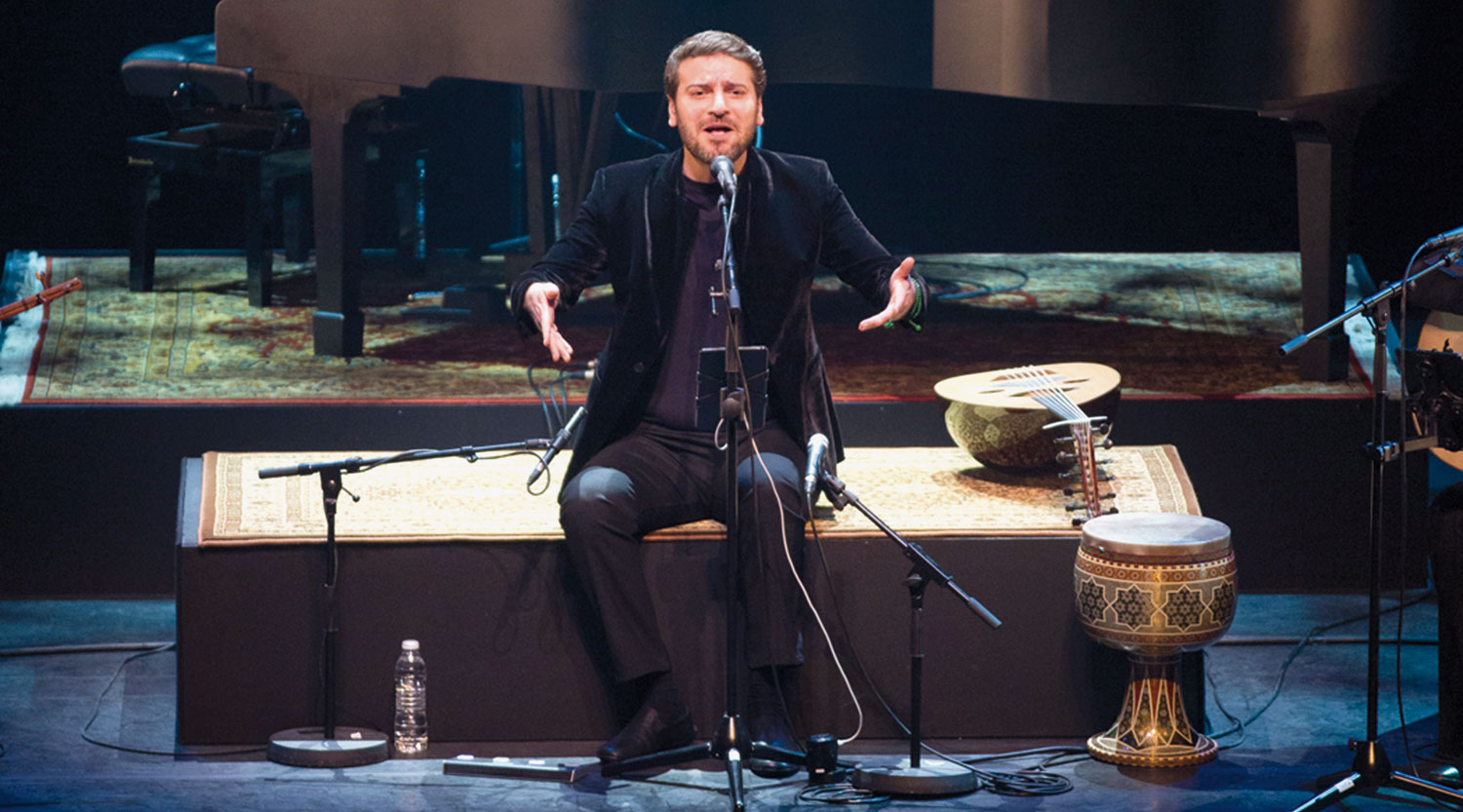

Sami Yusuf loves Oman and has a huge following here. Saturday evening saw his 3rd performance in the capital, but his first at the Royal Opera House Muscat, and of course it was sold-out well in advance. His message is Love, his medium is Tradition and his music a Sufi-Qawwali style of devotional singing bridging different strands of spirituality, making him ‘Islam’s Biggest Rock star’ on the circuit. The Guardian dubbed him “the biggest British star in the Middle East”. Born in Tehran of Azeri parents, Yusuf grew up in England and defines himself as British. With him were musicians from Turkey and Iran, non-Arabic countries in the Middle East, seated casually on blocks rather than chairs in a huge arc across the stage — an appealing, relaxed and egalitarian presentation of his ensemble.
Extensive programme notes for each song were provided in the souvenir booklet, including the words in English and Arabic. Emphasising the point, Sami Yusuf introduced each song himself in a lengthy preamble to each number, turning an 80-minute set into a substantial 105 minutes. He is a deep-thinking, philosophical 37-year-old, and he does not want the audience to lose sight of his message of Peace and Unity.
The show opened with ‘Dawn’, a Sami Yusuf original instrumental compositional, evoking East and West through the haunting sounds of the Ney, played by Turker Dinletir, a key musician in Yusuf’s entourage. It was swiftly followed by the first song, ‘I only knew love’, a poem by the 8th century female Sufi saint of Iraq, Rabi’a al Adawiyyah, set to a traditional Andalusian melody to the accompaniment of Persian Tanbour and Daf — setting out the truly cross-cultured theme of the evening. To be sure, it is not romantic love but Divine love being embraced here. Spanish guitar (and Tanbour) was played throughout the concert by the only English musician among the 10, Jonathan Lawton.
Moving to the Indian subcontinent, the ensemble performed an arrangement of the Sabri brothers’ devotion to the great 13th century Indian Sufi sage, Mu’in ad-Din Chishti, ‘Ya Nabi’ in Arabic, joined soon by the audience. Another Traditional Islamic Qawwali from India made famous by the Sabri brothers came towards the end of the programme. ‘Mast Qalandar’ is a tribute to the 12th century Sufi saint of Sindh, Qalandar, based on poems by Amir Khusro and Punjabi Sufi, Bulleh Shah. The emphasis here being how far back the Tradition stretches and yet still ‘has the power to transport the soul... to a state of contemplation of the Divine’. Everyone was invited to join in as the music got faster and faster, embellished by a brilliant Daf solo, to the point where the words could barely be heard above the loud clapping of an excited audience! Each song in the programme was quaintly attributed to either an Indian Raag, an Arabic Maqam or Western Mode (rather than scale). Also, the notes were careful to advise which album each may be found on — in case listeners would like to support the musicians by purchasing a copy?

A stirring Mahur ‘instrumental’ original composition by Yusuf, featuring a fine Tanbour (long-necked Kurdish or Persian Oud) solo by Adem Tosunoglu and dazzling percussion rhythms ‘embodied the essence of Khorasani sound from the province of Lorestan’ in Iran. It was followed by the Traditional Islamic ‘Ya Rasul Allah’, originally composed for six Ouds, but Sami added the devotional words later, again enabling an Arabic audience to participate. After this Sami moved to the elevated grand piano to perform his ‘deeply emotional and personal piece’, the 2008 single, ‘You came to me’ in a slightly pop English style with plenty of vocal reverb. For all the world it sounded like a romantic love-song, but is in fact a prayer to Prophet Muhammad (PBUH), accessible to listeners of all faiths.
A highlight of the concert came in the form of ‘Jaaneh Jaanaan’, an original setting of Traditional Persian Divine love poetry by Ustad Babak Radmanesh. It was lovely to hear Sami sing in Persian with confident ease and passion, beautifully incorporating a Tanbour solo and an impressive virtuoso percussion section.
Sami Yusuf is an accomplished musician, and during the concert he performed on Tar (a 3-coursed Persian fretted and plucked string instrument with very foxy tuning), Grand Piano (a Classical Western musical anachronism by his own admission!) the Tonbak (a Persian goblet-drum), and of course singing — a slightly nasal but clear, strong voice-quality, echoing the timbre of some 1970s Western folk singers.
Sadly, he cut two songs from the set list as he was running late, and it would have been interesting to hear “Mother” — a maternal ode in Arabic — and “Fire” — a hint at Zoastrian beliefs. The last song was appropriately his English composition ‘Go’ to words by his collaborator, Will Knox, and was easy to sing along to. But there was no encore, and the house lights came up quite abruptly at the end of a moving, hypnotic concert. I suppose Sami Yusuf would gently nudge everyone to buy his albums to recapture the magic of that night, in the intimacy of their own homes.
Georgina Benison
Oman Observer is now on the WhatsApp channel. Click here



